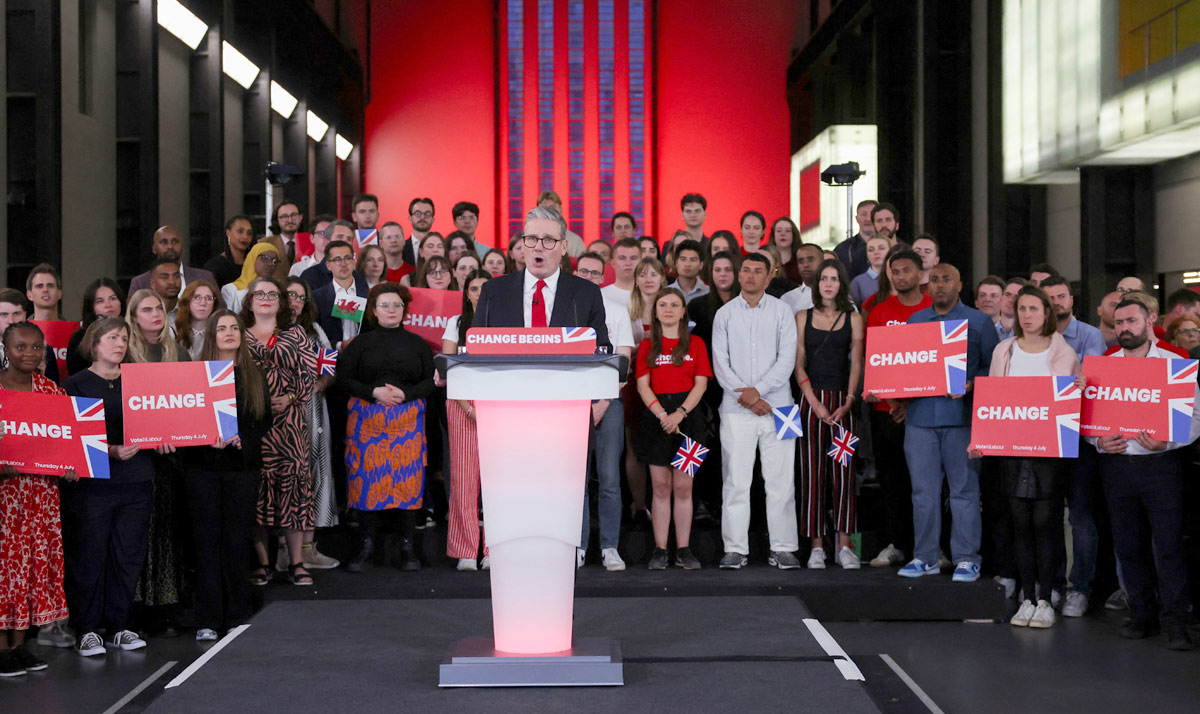Keir Starmer, the human rights barrister elected Britain's new Prime Minister on Friday, pledged a “reset” not only for the country but also for the Labour Party's relationship with the Indian diaspora to pursue a “new strategic partnership", including an FTA, with India if his party won a strong mandate.

Stramer-led Labour won the UK general election with a landslide. Starmer, 61, is the new prime minister, telling supporters at a victory rally that “change begins now.”
He will now be deservedly credited with achieving an impressive reversal of fortunes for Labour after a crushing election defeat in December 2019.
The other turnaround he has been working on is to try and re-build his party's relationship with British Indians, alienated under former leader Jeremy Corbyn over a perceived anti-India stance on Kashmir.
"Four and a half years of work changing the party, this is what it is for: a changed Labour Party ready to serve our country, ready to restore Britain to the service of working people," he declared in his victory speech.
As Prime Minister, his approach towards India is reflected in Labour's 2024 election manifesto, which commits to seeking a “new strategic partnership with India, including a free trade agreement, as well as deepening cooperation in areas like security, education, technology and climate change”.
“I have a clear message for you all today: this is a changed Labour Party,” declared Starmer at the India Global Forum (IGF) last year, setting the tone for the party's India-UK outlook.
“What my Labour government will seek with India is a relationship based on our shared values of democracy and aspiration. That will seek a free trade agreement (FTA), we share that ambition, but also a new strategic partnership for global security, climate security, economic security,” he said.
During a visit to the Shree Swaminarayan Temple in Kingsbury, north London, on the campaign trail last week, he sought to reassure British Hindus that there is “absolutely no place for Hinduphobia in Britain”. It is a message he has been reiterating over the past few years during celebrations of Diwali and Holi, projecting Labour as ready to govern after 14 years in Opposition.
Starmer, who was knighted by the late Queen Elizabeth II for his services to law and criminal justice, spent much of his career in the legal profession before stepping into the world of politics, first elected as Labour's member of Parliament from London in 2015. Father of two teenage kids, who he and his National Health Service (NHS) employee wife Victoria have chosen to keep out of the political spotlight, declared in his victory speech that the change he has promised will begin imminently.
Born in London to a toolmaker father and an NHS nurse mother, Starmer grew up in the town of Oxted in Surrey.
He has spoken emotionally about his mother, Josephine, suffering from the debilitating condition of Still's disease which she succumbed to a few weeks before he first became an MP in 2015.
He believes he has inherited the grit and determination of his mother and the strong work ethic of his father, Rodney, whose manual labour drives much of Starmer's vision to ensure respect for those who work hard.
In the televised election debates, Starmer often played second fiddle to the natural debating charm of Rishi Sunak and is often branded as being quite dull.
But just like Sunak, he also has a University of Oxford background where he studied law and rose up the ranks to be appointed the Director of Public Prosecutions (DPP) under a Labour-led government.
He has often drawn upon this experience as the chief prosecutor of the country in debates in the House of Commons, to claim that he has the practical experience of dealing with criminal gangs.
As a new MP in 2016, the staunch anti-Brexiteer assumed the key role of shadow Brexit secretary under then-leader Jeremy Corbyn and supported the latter to fight for what he says was the “future of the Labour Party”.
Following the debacle of the 2019 general election, he stepped up as party leader and has sought to distance himself from the past party line to stress that Labour under his leadership now has a fully costed manifesto that focusses on the key public concerns of housebuilding, growing the economy and fixing the NHS.
On foreign policy, there is likely to be a large degree of continuity as Labour chimes with the Tory stance on the UK's support for Ukraine in its ongoing conflict with Russia. Some changes are expected in the approach to the Israel-Gaza crisis, as Labour plans to stop arms sales to Israel and wants to progress towards recognising the Palestinian state.
The overall sense of a Starmerite vision for the UK is of a leader who is itching to fix things that he feels have been broken because of the “chaos” of several leadership changes within a divided Conservative Party in the past few years.
“If you want change, you have to vote for it” – has been the central theme and message of his general election campaign.
“And now we can look forward, walk into the morning, the sunlight of hope, pale at first but getting stronger through the day, shining once again, on a country with the opportunity after 14 years to get its future back,” he said after winning a landslide.








